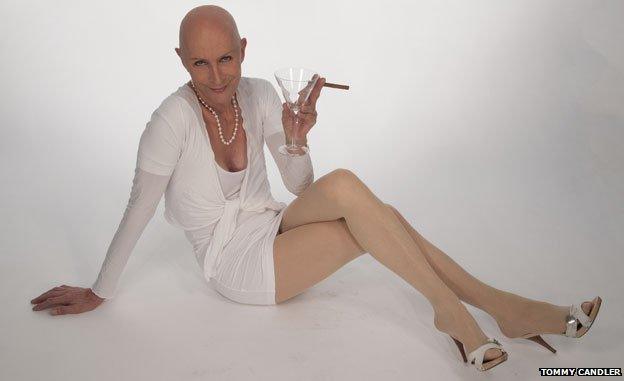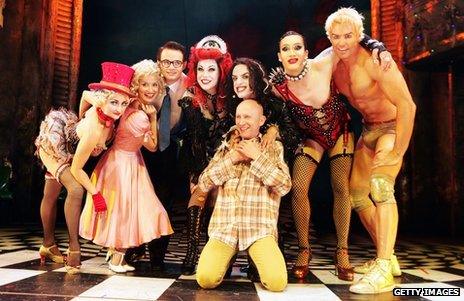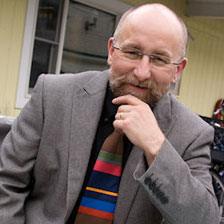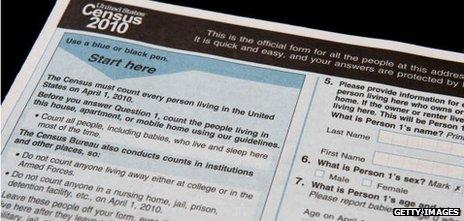Richard O'Brien: ‘I'm 70% man'
- Published

Rocky Horror Show writer Richard O'Brien thinks of himself as 70% male and 30% female. What exactly does that mean?
Richard O'Brien, writer of hit musical The Rocky Horror Show, delighted in shaking up the conservative sexual attitudes of the 1970s.
His most famous creation, Dr Frank N Furter, brought the house down with his song Sweet Transvestite.
But the show's creator was ashamed about his own long-held desire to be more feminine.
"I was six-and-a-half and I said to my big brother that I wanted to be the fairy princess when I grew up. The look of disdain on his face made me pull down the shutters. I knew that I should never ever say that out loud again."
For 50 years, O'Brien repressed the feeling. But "you can't just put the lid on things and pretend that they don't exist", he says.
So a decade ago, he started taking the female hormone oestrogen - and is happy with the results.
"It takes the edge off the masculine, testosterone-driven side of me and I like that very much. I think I've become a nicer person in some ways, slightly softer. For the first time in my life, I've started to put on a little bit of weight, which I like."
He has also developed small breasts. But O'Brien is not intending to go further and have sex reassignment surgery.
"I don't want to pretend to be something that I'm not. Anton Rodgers, the actor, said 'you're the third sex'. And I thought that's quite nice. I quite like that position.
"It's my belief that we are on a continuum between male and female. There are people who are hardwired male and there are people who are hardwired female, but most of us are on that continuum and I believe myself probably to be about 70% male, 30% female."

Richard O'Brien, centre front, with his Rocky Horror creations
O'Brien's idea of a gender spectrum may sound far-fetched to many, but there is scientific research that backs up his position. Cambridge University psychology professor Melissa Hines says there are not two distinct sexes, male and female.
"I think that the research in this field suggests just the opposite. That there is not a gender binary, that there's a range of gender, and there are many dimensions of gender and an individual person can be in a different position in terms of how masculine or feminine they are on each of these dimensions."
Professor Dinesh Bhugra, of the Institute of Psychiatry at King's College London, offers a different view - suggesting that while people may feel not entirely male, or female, the reality is that they are born one or the other.
"The distinction has to be made between gender and sex. Gender is very much a social construct, sex is biological.
"My guess would be that social notions of gender dictate how we behave."
So, how can one explain the feeling experienced by some transgendered people of having been born into the wrong body and wanting to switch sex?
It has been observed that the brains of male-to-female transsexuals resemble female brains in one region central to sexual behaviour. But it is not clear that this is a cause of transgenderism, rather than an effect.
Hines thinks the male hormone, testosterone, may have a part to play. She has noticed that girls who have been exposed to unusually high levels in the womb tend to prefer stereotypical "boys' toys" like trucks. And they are more likely than other girls to grow up wanting to live as men.
The UK's main gender identity clinic in Hammersmith, west London, saw 1,400 new referrals last year.
There they are assessed by psychiatrists who will help them adjust to their preferred gender role.
After two years of living as the opposite sex in the UK, you can apply for a gender recognition certificate, which allows you to change your birth certificate.
To qualify, there is no obligation to have changed your body in any way through hormones or surgery. That means you can officially be a woman with a man's body, or vice versa.
Stephen Whittle, professor of equalities law at Manchester Metropolitan University, realised as a 10-year-old that he didn't feel right as a girl.
"It was school races day and there were girls' races and boys' races. It was my light on the road to Damascus - this sudden realisation that I was always going to be in the wrong race."

Stephen Whittle campaigns for transgender rights
At 17, he started the process of changing sex. Surgery has left him with what he calls a "mixed body", but Whittle considers himself straightforwardly a man.
This is typical, says James Barrett, lead clinician at the Charing Cross National Gender Identity Clinic. Most of his patients identify as a man or a woman, rather than somewhere in between.
"People who are seeking drastic surgical or hormonal treatment because they wish to live in a socially ambiguous gender role… are thought about really carefully. The concern is that one doesn't want to do anything that's irreversible and then have them in a position where they're not happy."
The problem is, says Dr Barrett, they have to fit in to a society that that thinks in terms of just two sexes.
"It may well be that biological findings report that, in fact, everybody's on a spectrum. It's just that the way society works, most people don't think of themselves as on any kind of a spectrum at all.
"The same is probably true of sexual orientation. Most people don't describe their own sexual orientation as being on a spectrum although actually, practically speaking, it very much is."
Some transgender people do not choose to change their bodies completely, however.
This can lead to complicated situations, such as people who choose to live as women - but who have male genitalia - being sent to jail for sexual offences. Should they be imprisoned alongside men or women?

Official documents typically ask if the respondent is "male" or "female"
The law is clear that such a woman should go to a women's prison, says lawyer and former MP, Lord Carlile. He was the first to raise the issue of transgenderism in Parliament in the 1990s.
"If somebody goes into a court and is accused and their original name was 'John Smith' and they choose to call themselves 'Jane Smith' they will be tried as 'Jane Smith'. I don't see why what a court recognises should not also be recognised by the prison service.
"Awkward though it is, there are many people the prison service regards as challenging and difficult."
According to Whittle, the UK is gradually removing the requirements for people to declare whether they're a man or a woman. It has already happened with laws as diverse as the Sexual Offences Act and the Road Traffic Act.
He thinks the UK will follow Australia and Spain in doing away with the need to tick a box on your passport stating if you are male or female.
Which box does Richard O'Brien tick?
"I tick the M," he says. "But I would quite like to have Other to tick."
Listen to the full report on Analysis on BBC Radio 4 on Monday 18 March, 20:30 GMT and Sunday, at 21:30 GMT.
You can follow the Magazine on Twitter, external and on Facebook, external
- Published15 November 2011